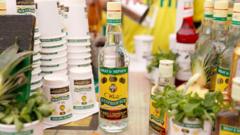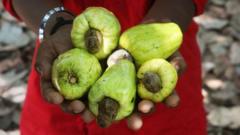Jamaica is embroiled in a nostalgic debate over the geographical indications for its rum, as the Spirits Pool Association pushes for stricter rules on aging methods, impacting several distilleries.
The Quest for Authenticity: A Legal Battle Over Jamaican Rum

The Quest for Authenticity: A Legal Battle Over Jamaican Rum
A dispute among Jamaican rum producers centers on what standards must be met for spirits to be labeled as "Jamaican rum," igniting fierce legal contention.
Article Text:
Rum is more than just a drink in Jamaica; it's a vital thread in the nation's cultural fabric. However, a contentious question looms: what qualifies as Jamaican rum? The ongoing debate among local producers highlights a critical issue regarding the authenticity and standards of this iconic spirit, as some stakeholders advocate for tightened regulations governing its designation.
Last October, Jamaica's Intellectual Property Office (JIPO) made significant changes to the geographical indication (GI) rules for Jamaica Rum, which was initially established in 2016. The new regulations prohibit aging rum outside of Jamaica, a move pushed by the Spirits Pool Association (SPA)—the collective voice for the island's six rum distilleries, including renowned names like Appleton and Hampden Estate.
The SPA contends that a more rigorous GI designation is essential for recognition in major markets—namely the European Union and the United States. They argue that this would bolster protection against competition and enhance recognition of Jamaican rum as a premium product, crafted to exacting standards in a specific geographical area.
However, the amendment has sparked intense backlash in Jamaica, particularly from National Rums of Jamaica (NRJ), which owns Long Pond and a significant portion of Clarendon distillery. The company's business model, comprising three shareholders including Demerara Distillers of Guyana and West Indies Rum Distillery (WIRD), relies heavily on exporting rum for aging abroad. They assert that even rum aged overseas retains its Jamaican essence and that their longstanding practices should not be curtailed.
The NRJ has formally appealed JIPO's ruling, with a hearing slated for April 28. This dispute raises critical questions about whether rum produced on the island but aged elsewhere should bear the "Jamaican" label. The SPA has expressed confusion over NRJ’s objections, pointing out that the spirit's critical aging process—essential for preserving its unique character—should occur on Jamaican soil.
In addition, the SPA highlights the economic implications of aging rum abroad, arguing that Jamaica misses vital opportunities linked to refining, bottling, and tourism related to its rum industry.
Academics like Dev Gangjee, a professor of intellectual property, emphasize the value of GIs, noting that they command higher prices for distinctive products and promote regional production, allowing brands to retain their unique qualities.
Across the Caribbean, discussions around GIs are similarly contentious. Barbados is currently facing its own challenges, attempting to establish a rum GI but encountering objections from WIRD, mirroring Jamaica's plight.
Back in Jamaica, the SPA seeks to pursue EU’s Protected Geographical Indication status once JIPO's proceedings are wrapped up. Despite the discord, both parties express hope for a compromise in the future. Mr. Gentles of the SPA remarks on the pride surrounding Jamaican rum, underscoring its deep-rooted connection to the nation’s history and identity.
The recent ruling has garnered support from local media, with The Gleaner advocating for the integrity of Jamaican brands against foreign appropriation. The path ahead remains uncertain, but the commitment to preserving the authenticity of Jamaican rum is clear.
Rum is more than just a drink in Jamaica; it's a vital thread in the nation's cultural fabric. However, a contentious question looms: what qualifies as Jamaican rum? The ongoing debate among local producers highlights a critical issue regarding the authenticity and standards of this iconic spirit, as some stakeholders advocate for tightened regulations governing its designation.
Last October, Jamaica's Intellectual Property Office (JIPO) made significant changes to the geographical indication (GI) rules for Jamaica Rum, which was initially established in 2016. The new regulations prohibit aging rum outside of Jamaica, a move pushed by the Spirits Pool Association (SPA)—the collective voice for the island's six rum distilleries, including renowned names like Appleton and Hampden Estate.
The SPA contends that a more rigorous GI designation is essential for recognition in major markets—namely the European Union and the United States. They argue that this would bolster protection against competition and enhance recognition of Jamaican rum as a premium product, crafted to exacting standards in a specific geographical area.
However, the amendment has sparked intense backlash in Jamaica, particularly from National Rums of Jamaica (NRJ), which owns Long Pond and a significant portion of Clarendon distillery. The company's business model, comprising three shareholders including Demerara Distillers of Guyana and West Indies Rum Distillery (WIRD), relies heavily on exporting rum for aging abroad. They assert that even rum aged overseas retains its Jamaican essence and that their longstanding practices should not be curtailed.
The NRJ has formally appealed JIPO's ruling, with a hearing slated for April 28. This dispute raises critical questions about whether rum produced on the island but aged elsewhere should bear the "Jamaican" label. The SPA has expressed confusion over NRJ’s objections, pointing out that the spirit's critical aging process—essential for preserving its unique character—should occur on Jamaican soil.
In addition, the SPA highlights the economic implications of aging rum abroad, arguing that Jamaica misses vital opportunities linked to refining, bottling, and tourism related to its rum industry.
Academics like Dev Gangjee, a professor of intellectual property, emphasize the value of GIs, noting that they command higher prices for distinctive products and promote regional production, allowing brands to retain their unique qualities.
Across the Caribbean, discussions around GIs are similarly contentious. Barbados is currently facing its own challenges, attempting to establish a rum GI but encountering objections from WIRD, mirroring Jamaica's plight.
Back in Jamaica, the SPA seeks to pursue EU’s Protected Geographical Indication status once JIPO's proceedings are wrapped up. Despite the discord, both parties express hope for a compromise in the future. Mr. Gentles of the SPA remarks on the pride surrounding Jamaican rum, underscoring its deep-rooted connection to the nation’s history and identity.
The recent ruling has garnered support from local media, with The Gleaner advocating for the integrity of Jamaican brands against foreign appropriation. The path ahead remains uncertain, but the commitment to preserving the authenticity of Jamaican rum is clear.





















